First, study any unfamiliar words here:
| 🦄 Unicorn 🦄 Definition: A mythical horse-like creature with a single horn on its forehead. Example Sentences: The young girl imagined riding a unicorn through a magical forest. In many stories, a unicorn’s horn has special healing powers. 🐴🪽 Pegasus/Pegasi 🐴🪽 Definition: A mythical winged horse (Pegasus is singular, Pegasi is plural). Example Sentences: In Greek myths, a Pegasus could fly high above the clouds. Several pegasi in the story showed off their dazzling wings. 🔄 Transformation 🔄 Definition: A complete change in form, appearance, or character. Example Sentences: The transformation from caterpillar to butterfly is fascinating. Moving to a new country led to a big transformation in her life. ✨ Spell ✨ Definition: A special set of words or actions believed to have magical power. Example Sentences: The wizard cast a spell to turn the old chair into gold. In fairy tales, a magic spell can often break any curse. 🏠🐎 Stable 🏠🐎 Definition: A building where horses or other farm animals are kept. Example Sentences: We put the horses in the stable each night for safety. The stable smelled of fresh hay and leather saddles. 🏇 Gallop 🏇 Definition: To run fast (usually referring to a horse) with all four feet off the ground in each stride. Example Sentences: The horse began to gallop across the open field. When we heard thunder, we saw the animals gallop back to their shelter. 🔍 Perfection 🔍 Definition: The quality of being as good as it is possible to be; a state of flawlessness. Example Sentences: Some people spend hours trying to achieve perfection in their work. She realized that chasing perfection could make her more stressed instead of happier. 🤨 Ironic 🤨 Definition: Describing a situation that is strange or funny because it is the opposite of what is expected. Example Sentences: It’s ironic that he complained about being late, yet he arrived after everyone else. The movie’s ending was ironic because the villain accidentally saved the day. 🤔 Thoughtful 🤔 Definition: Showing consideration for others or deep thinking about something. Example Sentences: She is always thoughtful when choosing gifts for her friends. After the meeting, he remained quiet and thoughtful for a long time. 🙌 Boast 🙌 Definition: To speak too proudly or happily about what you have done or what you own. Example Sentences: He likes to boast about his fast car whenever he meets new people. It’s okay to share achievements, but try not to boast too much. ❤️ Genuine ❤️ Definition: Real, sincere, or honest; not fake or pretending. Example Sentences: Her smile was genuine, and everyone felt her kindness. It’s important to find genuine friendships rather than shallow ones. 🆔 Identity 🆔 Definition: The qualities, beliefs, or characteristics that make a person (or thing) unique. Example Sentences: Moving to a new country made her think a lot about her identity. Each culture has its own identity, shaped by its history and traditions. ⛔ Irreversible ⛔ Definition: Not able to be changed back to an earlier state; impossible to undo. Example Sentences: The scientist warned that the damage to the environment might be irreversible. Think carefully before making an irreversible decision. 🚫 Pointless 🚫 Definition: Having no purpose or reason; not worth doing. Example Sentences: He felt it was pointless to argue once the decision was made. If there is no goal, the task can seem pointless. |
Word Count: 3055
Reading Level: CEFR C1
The Only Horse in the Great Land of Parpados
A long time ago, in the magical land of Parpados, there were rolling hills, peaceful farms, and small villages where all the animals could speak like humans. They laughed, made jokes, and shared stories. Cows exchanged gossip over the fences, goats discussed the weather at the water troughs, and pigs boasted about their clever tricks. All around, you could see the colorful roofs of the houses in the towns, and farmers whistled happily while tending their crops. In this friendly and magical land, there lived a young horse named Peter. He was an energetic horse with a shiny brown coat, and everyone recognized his gentle eyes and curious spirit.
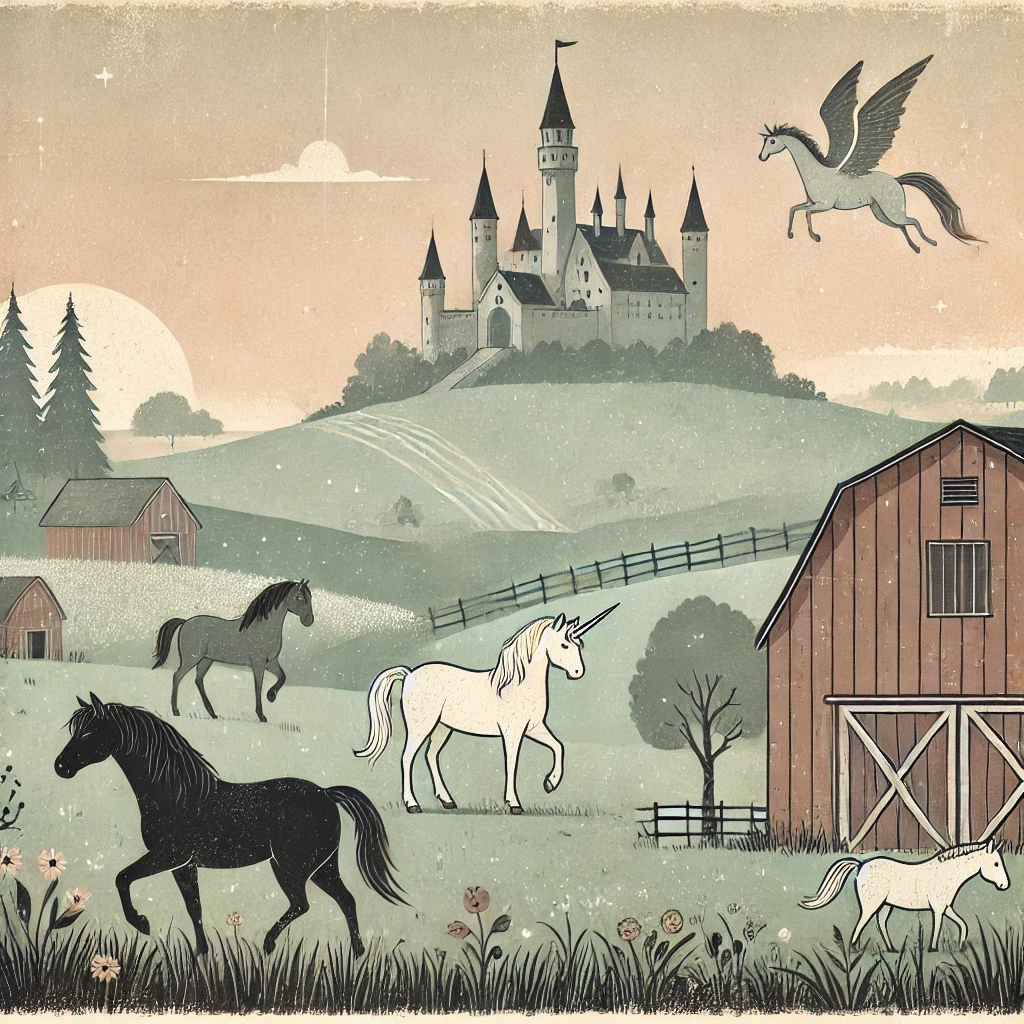
Peter’s farm lay at the edge of a vast meadow. The grass there was bright green, as if it had been painted by the morning sun. Near the meadow stood a small wooden cottage surrounded by tall sunflowers; that was Peter’s home. He shared the farm with his family—his mother and father, who spent their days grazing under the warm sun, and his younger sister, who often galloped around, feeling the wind blow through her mane. Their life was simple and joyful, defined by long walks through the fields and peaceful nights filled with the songs of crickets.
However, as the years passed, something began to change in Parpados. A traveling wizard named Arcadia arrived, bringing with her a very special spell: a spell to turn ordinary horses into unicorns or pegasi. At first, only a few adventurous horses sought out Arcadia, curious about the mysterious transformation. The idea of having a beautiful horn or a pair of amazing wings was exciting. Those who got the spell returned with elegant horns that sparkled like diamonds or with wings that gleamed as if made of silver feathers. They paraded through the towns, showing off their new forms, attracting admiring glances and cheers from other animals. Soon, more and more horses decided that they, too, wanted horns or wings. They said they wanted to stand out, to be special in some way.
Peter watched these changes with mixed emotions. On one hand, he admired his friends’ beautiful new horns and wings. It was hard not to be impressed by the amazing colors and the powerful flaps of wings against the wind. He heard them talk with excitement about how much better life was now that they could be recognized from a distance, floating above the clouds or drawing rainbows with their horns. On the other hand, Peter had always been content with his life as a horse. He enjoyed racing across open fields and feeling the earth under his hooves, something he believed connected him to nature itself. He liked his sturdy, brown legs and his simple but reliable form. For Peter, being a horse was part of his identity.
But there was a growing problem in Parpados. The more unicorns and pegasi there were, the more they wanted to look unique and extraordinary. At first, a few had simple white wings or small silver horns. Soon, others paid Arcadia extra to get bigger, more colorful horns or better wings with special patterns, making each new transformation more dramatic than the last. Some unicorns started complaining that their horns were not shiny enough. Others worried that their wings were smaller compared to their friends’. A few horses went back to the wizard for a second or third transformation, trying to stay ahead of the trend.
Peter felt the pressure. Wherever he went, he heard other animals whisper, “Why haven’t you changed yet, Peter? You could be a gorgeous unicorn! Imagine how bright your horn would be!” He also heard rumors that his friends teased him behind his back, calling him “slow-hoofed” or “old-fashioned.” They asked him outright, “Don’t you want to be special?”
At times, Peter felt tempted. One afternoon, he visited Arcadia’s cottage to find out more. The small wooden door opened, and there stood the wizard, an older woman with silver hair and eyes that sparkled like moonlight. She greeted him kindly and told him about the spell. “Once I place this enchantment on you,” she explained, “you will gain a beautiful horn if you choose the path of the unicorn, or amazing wings if you choose the path of the pegasus. Everyone will see you differently from that day on. But remember: the transformation is permanent.”
Peter hesitated. “What if I change my mind afterward?” he asked. He had heard rumors that the spell was irreversible, yet he wanted to be sure.
Arcadia’s face turned serious. “I cannot undo this magic, my friend,” she said gently. “Once a horse becomes a unicorn or a pegasus, it lasts forever. You must think carefully before you decide.”
Peter thanked the wizard for her time and trotted back to his farm. He wandered through the sunflower field, the bright blossoms swaying around him, their seeds attracting little birds. He lay down in the grass and looked at his reflection in a small pond. His face was that of a horse, simple and familiar. For a long while, he stared at his own reflection, imagining it with a horn and then with wings. For a moment, he thought it looked beautiful. But then, he also felt a sense of loss. The reflection with a horn was not the Peter he had always known. Would he still like to run in the fields as much if he turned into a unicorn?
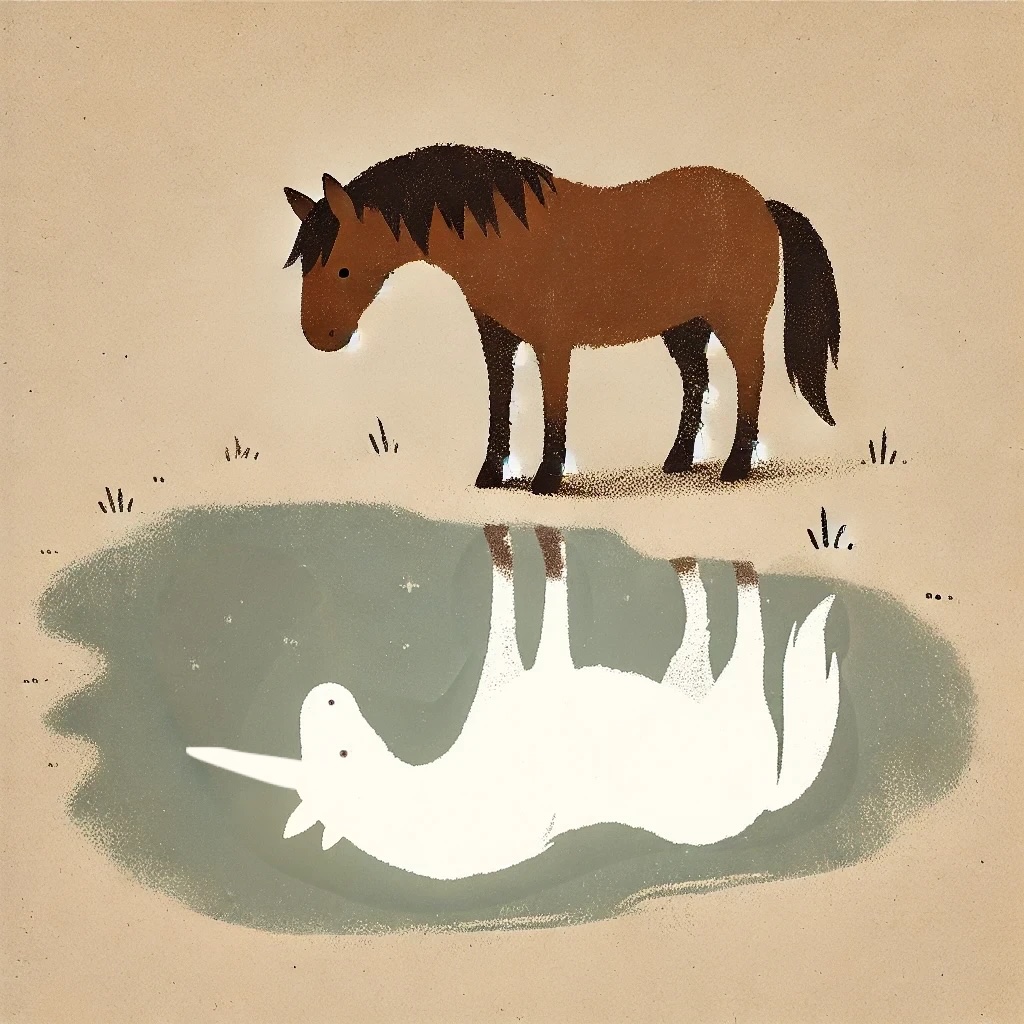
That night, he dreamed of flying among stars and rainbows if he got wings, or shining brightly with a magical horn. But he also dreamed of the peaceful comfort of his old life, how proud he was of his steady body and strong legs. When he woke up, the question still hovered in his mind: “Should I change, or should I remain as I am?” Every day after that, more of his friends disappeared from the fields, returning soon as unicorns or pegasi. Some flew above his head with delight. Others cast bright spells from their new horns, producing magical fireworks in the sky.
“You are going to be left behind, Peter,” a pegasus named Starfrost warned him one day. “There will be no horses left soon. Don’t you want to stand out? You won’t fit in with us if you stay this way.”
Peter felt sad, thinking about those words. It was true that all the other horses he knew were changing. They had horns that shined like precious stones or wings that sparkled in the sunlight. Some had even upgraded ten times or more, chasing a kind of ever-changing idea of perfection. Indeed, some of the newly transformed unicorns looked at each other suspiciously, comparing the lengths of horns, checking whose color was brighter. Pegasi lined up their wings, measuring who had the widest wingspan. The same animals who had once been proud to graze side by side were now vying to be the most extraordinary in the group.
The pressure rose until Peter almost made up his mind to visit Arcadia’s cottage again. “I can’t just stay a normal horse,” he thought. “Everyone else has changed. Will the world forget me if I remain like this?” But, still, a quiet voice inside his heart reminded him that he was happy with who he was. Did he really want to carry a horn on his forehead, or wings on his back, just because others insisted it was better?
One evening, while the sun was setting in fiery red and orange shades, Peter wandered to the top of a hill. He let his eyes sweep across the changing land. In every direction, he saw flashes of color—wings, horns, spells. A few unicorns were practicing new tricks in the air, while pegasi performed loops, spins, and twirls. In that moment, he realized something: those who had changed didn’t always look truly happy. Sure, they showed off, but many were actually nervous, always trying to prove they were good enough with their new enhancements.
Peter thought deeply and recalled Arcadia’s words: “It is permanent.” He knew that once he made the decision, there would be no going back. And he wondered, “Is it worth giving up my natural self for this new appearance?” He also worried that all these transformations might become meaningless if everyone did them. Could a unicorn be truly unique if almost every horse in Parpados grew a horn?
The next morning, the sun peeked through his window. Peter awoke with a renewed confidence and clear understanding. He hurried to see his best friend, Clover, who had turned into a unicorn just a few weeks earlier. He found Clover near the orchard, practicing with her horn, trying to create a new color of sparkles. Clover looked exhausted.
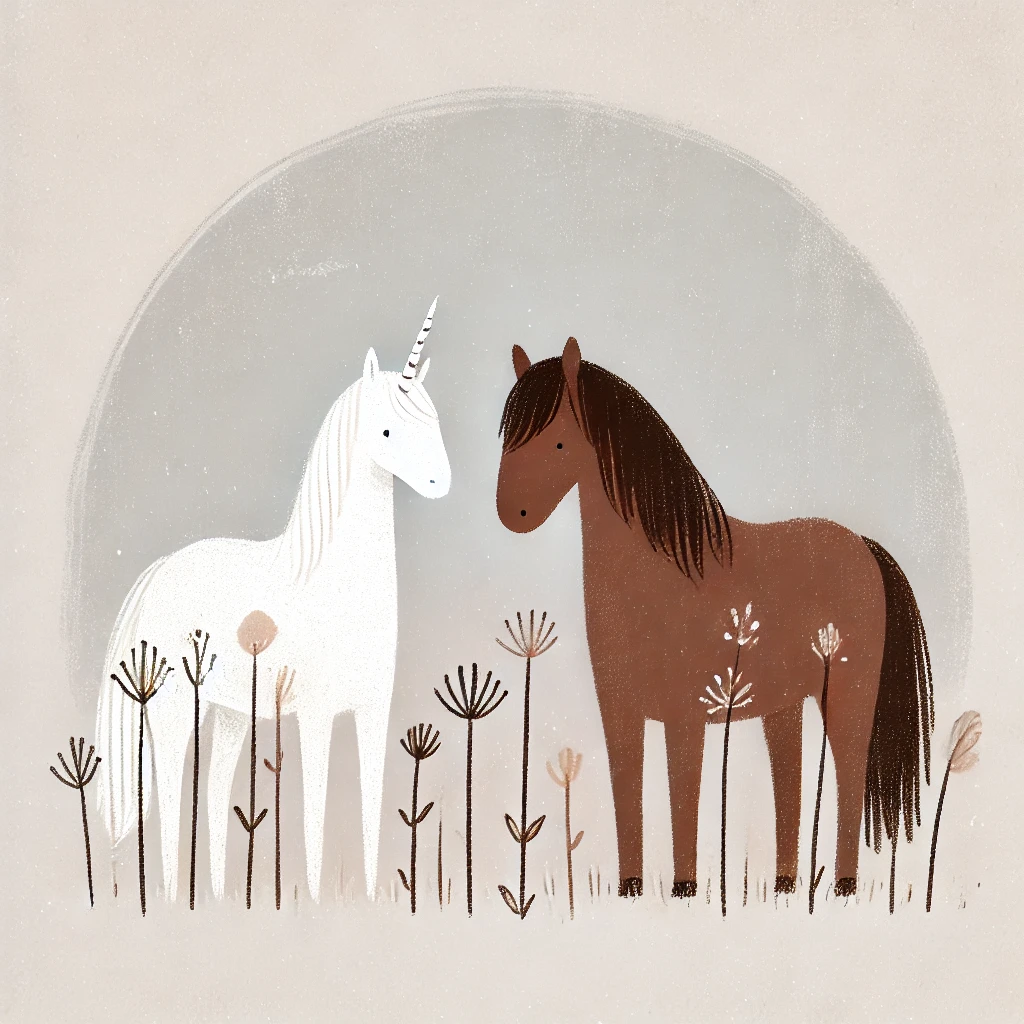
“Peter, did you come to get the spell too?” asked Clover, panting from concentration.
“No,” he replied gently. “I just wanted to check on you. You look tired.”
Clover sighed. “I’ve been trying to make my horn shine a brighter pink, but it isn’t working. Others have even bigger horns now, some with swirls of gold. I feel…like I need to keep up.”
“Is it making you happy?” Peter asked quietly.
Clover turned away, unable to answer. After a while, she admitted in a whisper, “When I first got my horn, I was thrilled. But now, every day, there’s a new style or color that everyone says is better than mine. It never ends, Peter.”
Hearing this, Peter felt his heart twist with understanding for Clover’s feelings. He didn’t want that cycle of never-ending comparisons. He realized he loved the certainty of just being himself, galloping freely in the fields without worrying about whether his horn was shiny enough or his wings were the biggest.
Soon, the day came when Peter had to give his final answer. Arcadia paid a visit to all the horses who hadn’t yet transformed, offering one last chance. By now, only Peter and a handful of others remained in their natural forms. One by one, even the remaining few decided to go for the spell, crazy for the promise of external beauty. When Arcadia approached Peter, she said, “My dear, are you ready to receive your horn or wings? If you wait any longer, the rest of your friends might move on to a world where horses no longer exist.”
Peter stood straight, his brown coat gleaming in the sunlight. He felt a small quiver inside, but his eyes were determined. “Thank you for your kind offer,” he said softly. “But I choose to stay a horse.”
A look of surprise flickered across Arcadia’s face. “Are you sure? Everyone else has chosen the transformation. You will be truly alone.”
Peter nodded. “Yes, I have thought for a long time. I like who I am. I want to keep my four hooves on the ground, feeling the grass and earth beneath me. I want to stay true to myself.”
With that, Arcadia simply smiled, gave a respectful bow, and moved on. It did not take long for her to finish her mission. Over a short period, every single horse in Parpados, aside from Peter, had been transformed. By the next spring, the fields were filled with unicorns and pegasi alone. They fluttered and shined wherever they went. No other plain horse roamed the hills.
Yet, something unexpected happened. At first, the newly transformed unicorns and pegasi bragged about how wonderful their horns and wings were. But as weeks turned into months, they began to question whether this was as special as they had imagined. With no normal horses around for comparison, a horn was no longer so unusual. Wings were not a rare spectacle, since nearly everyone had them. All those bright colors and sparkles mixed together, creating a sort of routine background. In the crowd, some horns flashed purple, some gold, some were swirled with pink and green, but ironically, that made it more difficult to stand out than before.
And where was Peter? Although many had said he would be alone, he found something extraordinary beginning to happen. In the same fields where he had once galloped with his friends, Peter now ran freely, the only horse left in all of Parpados. The wind still sang in his mane, the grass still kissed his hooves, and the morning sun still bathed him in golden rays. When unicorns and pegasi saw him from a distance, they stopped what they were doing. They couldn’t help but stare, remembering their own original forms. Peter had become a breathtaking sight: the last horse in the land. While all the horns and wings looked similar in their magic, Peter’s simplicity shined like a rare and precious gem.
The unicorns and pegasi approached him with wonder and even a touch of envy. “Peter,” they would say softly, “we had forgotten how beautiful it was to be a horse. Look at your natural shape, your smooth coat, your powerful legs. It’s so strange—now you are the most special of us all.”
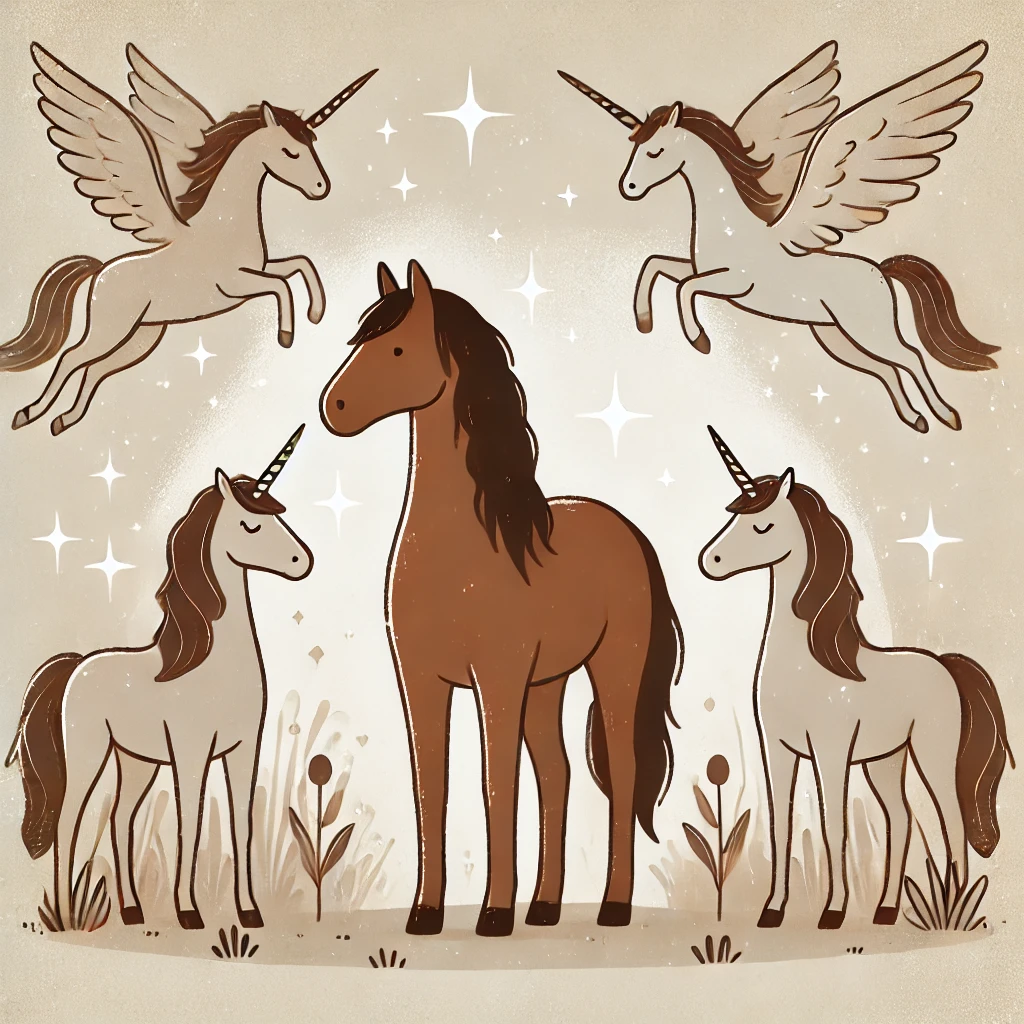
Peter gave them a kind smile. “You see, my friends,” he said, “you were special as horses long ago. That was a gift you already had, but perhaps you didn’t realize it.”
A group of unicorns flicked their tails in regret. “We remember teasing you for not changing, and now we regret it,” they admitted. “When everyone chases the same idea of perfection, we lose the sense of who we are. We forgot how good it felt simply to be ourselves.”
One day, Clover, who had once been Peter’s close friend, came trotting up on delicate hooves, her shimmering horn tilted toward the ground. She looked at Peter with tears in her eyes. “I miss being a horse,” she whispered. “I miss those days when we used to gallop across the meadow without a care. Now, my horn can do many tricks, but it never brings me the peace that running by your side once did.”
Peter gently touched his nose to Clover’s cheek. “I’m sorry you feel unhappy,” he said quietly. “Perhaps you can find a new peace in who you are now. But please remember: You were always wonderful before any magical changes.”
A crowd formed around them, full of unicorns and pegasi, each wearing a sorrowful expression. They remembered the days when they were horses, standing in the old stables, feeling comfortable with their own forms. Yet, no one could go back now. The spell was irreversible. They had chased a dream of being “more perfect,” but in doing so, they had lost what made them individual and rare.
Meanwhile, Peter continued to live a life filled with the same joys as before—only now, everyone recognized how valuable it was. His neighbors and former friends invited him to parties and festivals, asking him to speak about why he had stayed true to himself. He explained that it had been a difficult choice—everyone around him had changed, and it would have been easy to follow them. But he had looked within his heart and decided he would not be happier with a horn or wings. He realized that external changes could not give him the sense of peace he already found in being who he was.
Word spread across Parpados about Peter’s decision, and other animals came to understand its meaning. The cows, goats, and pigs, who once only discussed the weather or local gossip, began to talk more thoughtfully about self-worth. They noticed that many of the new unicorns and pegasi were no more satisfied than before. A wise old cow remarked, “We must learn from Peter. True confidence comes from within, not from looking like everyone else’s idea of beauty.”
Over time, the unicorns and pegasi grew to accept that they could not become horses again. They found other ways to rediscover contentment, learning to be grateful for their lives, even if it meant carrying permanent horns or wings that no longer seemed so extraordinary. The mania for bigger horns or more vibrant wings slowly faded as they realized how pointless it was to chase trends that kept changing. They began to focus on genuine friendships, community events, and finding meaning in simple joys—like the smell of fresh grass after rain or the comfort of a good conversation.
Peter’s life stayed calm and grounded, just as it had always been, yet now others respected him in a new way. He was not only the last horse in Parpados; he was a symbol of authenticity. Children of all species, from small lambs to shy foals, visited his farm to ask him about his choice. He always replied kindly, with a gentle voice, “We need to look into our hearts to see what truly makes us feel complete. If it is changing into something else, then that’s a personal choice—but don’t do it because you feel pressured by others or by popular trends. Do it, if you must, because it aligns with your deepest self. As for me, I realized I was happiest remaining what I was born to be—a horse.”
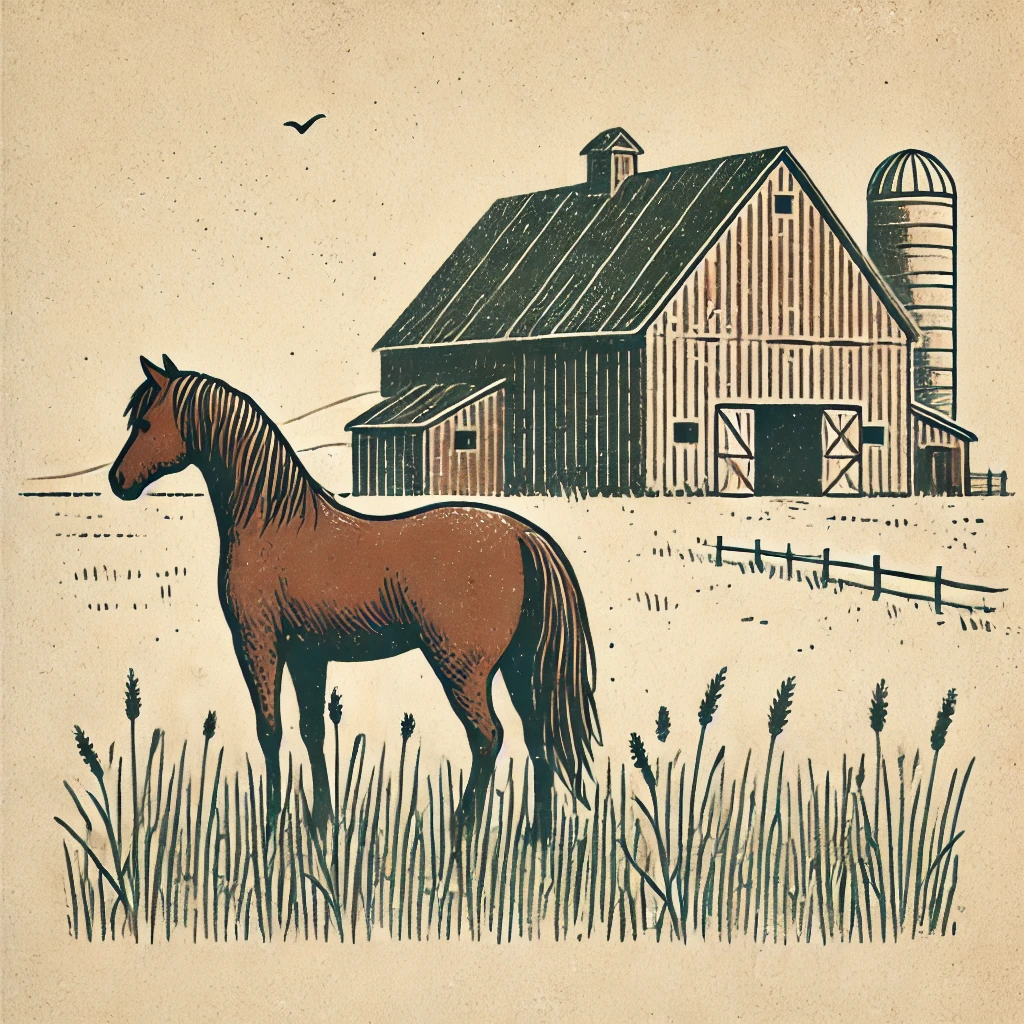
From that time on, Parpados never forgot Peter’s story. Centuries later, the unicorns and pegasi passed on the tale to their children. They spoke of a wise horse who chose not to join the rush for transformation. This horse taught everyone to recognize the beauty of their original selves, reminding them that it was sometimes braver to remain unchanged when the entire world screams for change. Rumor has it that even now, in the far meadows of Parpados, an old horse with a kind spirit still gallops, greeting every dawn with a steady gallop over dew-kissed grass. When the sun’s rays shine down upon him, making his coat shine, he looks every bit as extraordinary—if not more—than the sparkling horns and wings that surround him.
And so the story ends with a lesson beating with the heart of Parpados: Not everything that glitters brings happiness, and sometimes the greatest magic is accepting the unique qualities you already have. Be yourself, find your own worth, and do not chase dreams of perfection that might lead you away from your true identity. For Peter the Horse, the simplest choice turned out to be the most magnificent one of all.
Questions about the story:
Why did Arcadia visit Parpados?
A. She wanted to become a horse.
B. She planned to buy a farm.
C. She brought a spell to transform horses into unicorns or pegasi.
D. She came to teach the animals a new dance.
Which feeling best describes Peter’s initial reaction to the transformations around him?
A. Pure excitement with no doubts at all.
B. Mixed emotions—both admiration and uncertainty.
C. Anger and resentment toward his friends.
D. Indifference and boredom.
What did Arcadia warn Peter about her spell?
A. The spell would make him lose his voice.
B. It would only last for one year.
C. It could only be used during a full moon.
D. Once changed, he could never go back to being a horse.
Why did Clover feel unhappy after becoming a unicorn?
A. She didn’t like the color of her horn.
B. She missed the peace of her old life and felt pressure to keep improving her horn.
C. She had trouble using her magic.
D. She was jealous of pegasi and wanted wings instead.
What final decision did Peter make when Arcadia came to him for the last time?
A. He asked for both a horn and wings.
B. He chose to become a pegasus.
C. He decided to stay a horse, true to himself.
D. He sold his farm and moved away.
What happened in Parpados after nearly all the horses became unicorns and pegasi?
A. Peter was forced to leave the land.
B. There was no longer anything special about horns or wings because everyone had them.
C. Clover came up with a spell to turn everyone back into horses.
D. Arcadia took away everyone’s magic.
What is the main lesson of Peter’s story?
A. You should always follow the latest fashion.
B. Magical transformations solve all problems.
C. True happiness comes from being authentic and valuing who you already are.
D. Having a horn or wings is the only way to be extraordinary.
Answer Key:
Why did Arcadia visit Parpados?
A. She wanted to become a horse.
B. She planned to buy a farm.
C. She brought a spell to transform horses into unicorns or pegasi. ✅
D. She came to teach the animals a new dance.
Which feeling best describes Peter’s initial reaction to the transformations around him?
A. Pure excitement with no doubts at all.
B. Mixed emotions—both admiration and uncertainty. ✅
C. Anger and resentment toward his friends.
D. Indifference and boredom.
What did Arcadia warn Peter about her spell?
A. The spell would make him lose his voice.
B. It would only last for one year.
C. It could only be used during a full moon.
D. Once changed, he could never go back to being a horse. ✅
Why did Clover feel unhappy after becoming a unicorn?
A. She didn’t like the color of her horn.
B. She missed the peace of her old life and felt pressure to keep improving her horn. ✅
C. She had trouble using her magic.
D. She was jealous of pegasi and wanted wings instead.
What final decision did Peter make when Arcadia came to him for the last time?
A. He asked for both a horn and wings.
B. He chose to become a pegasus.
C. He decided to stay a horse, true to himself. ✅
D. He sold his farm and moved away.
What happened in Parpados after nearly all the horses became unicorns and pegasi?
A. Peter was forced to leave the land.
B. There was no longer anything special about horns or wings because everyone had them. ✅
C. Clover came up with a spell to turn everyone back into horses.
D. Arcadia took away everyone’s magic.
What is the main lesson of Peter’s story?
A. You should always follow the latest fashion.
B. Magical transformations solve all problems.
C. True happiness comes from being authentic and valuing who you already are. ✅
D. Having a horn or wings is the only way to be extraordinary.
Conversation Starters:
Working with a partner or small group, please discuss a few of these questions, and try to reference the content of the story as much as possible. Also, please try to use any grammar or vocabulary that you are studying recently, and take notes when you hear a new word or learn a new way to say something.
- If you lived in Parpados, would you choose to become a unicorn or a pegasus, or would you stay a horse like Peter? Why?
- Peter felt pressure from his friends to change, but he stayed true to himself. Have you ever experienced a situation where you felt pressured to follow a trend or make a change? How did you handle it?
- The unicorns and pegasi in the story kept trying to “upgrade” their horns and wings to stand out. Do you think this happens in real life too? Can you think of examples where people are always trying to get the latest, best version of something?
- Imagine that Arcadia could give a magical transformation spell to humans. What kind of changes do you think people would ask for, and do you think they would be truly happy afterward?
- Clover realized that she missed being a horse, but she could never go back. If you could reverse one decision in your past, what would it be and why?
- The story teaches that being yourself is important. But is there ever a time when change is a good thing? How can we tell when we should change and when we should stay true to ourselves?
- If you could create an alternative ending for this story, how would you change it? Would Peter stay a horse, or would something else happen?
If you are completing these conversations for a class activity, please share your group’s most interesting ideas and opinions with the rest of the class.


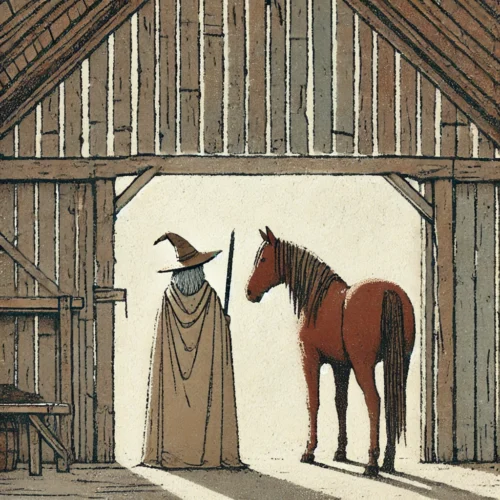
Leave a Reply